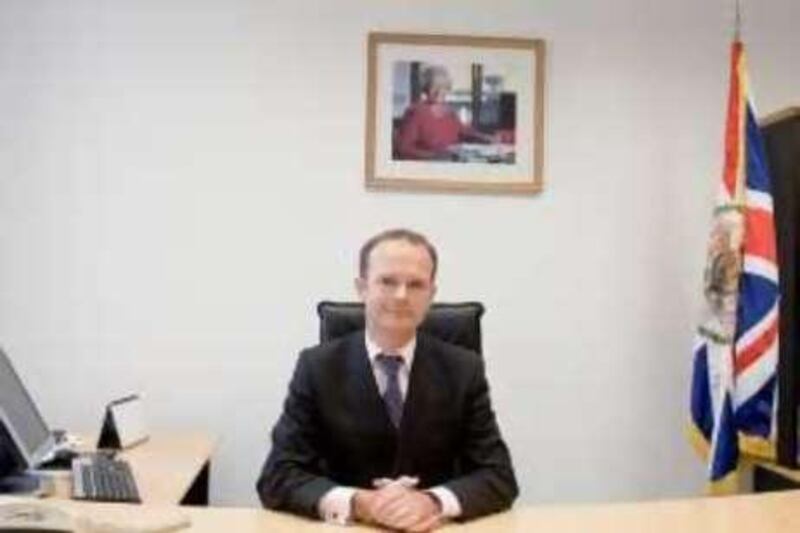ABU DHABI // The new British government is determined to revitalise a relationship with the UAE that has been taken for granted in recent years, according to Dominic Jermey, the country's incoming ambassador.
Although the UAE and the UK have a long history together, the Conservative-Liberal Democrat coalition that came to power in May is keen to build on a friendship that it believes has not been maximised. "This is a relationship that has run for many, many years and yet there is a sense that, given all that, it should be more of a close relationship than it feels at the moment," Mr Jermey said. "There are so many countries that are bilaterally important to the UAE, and that's something that the British government is determined to do something about.
"It's a relationship that could be stronger than it is at the moment. There's a sense of potential." Mr Jermey officially took up his position as ambassador last month during one of the most interesting crossroads in British politics in 20 years, presenting his credentials just days after the coalition government came into power. With British diplomats expected to reflect whatever is the government's view, Mr Jermey says he is one of the few who has had the opportunity to start with a "clean slate".
Just over a month into the new government's term, the UAE has already played host to two high-level visits from British politicians - Dr Liam Fox, the defence secretary, followed shortly after by the prime minister David Cameron. The purpose of the trips was to send a "very strong signal" of the UK's intention to put relations on a new track, Mr Jermey said. By meeting with Sheikh Khalifa bin Zayed, the President of the UAE, Mr Cameron hoped to convey the message: "I'm here. I've come to you early. I'm making a point of coming to you early because I'd like to build this relationship in a way that I don't think we've achieved so far," the ambassador said.
Dr Fox's visit indicates one of the key areas that the UK is seeking to boost through increased co-operation: defence and security. With British and UAE troops serving together in Afghanistan, and the two countries sharing regional security concerns and diplomatic goals, the UAE is a "very, very serious partner", Mr Jermey said. There are around 250 Emirati troops in Afghanistan, largely working with the British in Helmand defusing roadside bombs.
"It's a really good example of us being at the sharp end together," he said. With Iran's nuclear programme one of the most immediate and serious security threats facing the international community, moderate allies in the region are particularly important to the UK, he said. "We have shared concerns about the region and about Iran's intentions, and what is it that we should do in order to achieve the outcome we want, which is a stable, nuclear-weapons-free area," the ambassador said.
The UK is also looking to work more closely with partners such as the UAE to address "asymmetric" security threats from non-state actors, such as terrorism. Britain is implementing a Strategic Defence and Security Review, which will assess how better to allocate defence resources in order to address these current threats, and how best to utilise relationships with international partners like the UAE while cutting defence costs by a quarter.
The ambassador said that boosting defence co-operation as the UK tries to implement austerity measures is "just something we are going to have to deal with". Mr Jermey declined to discuss any "detailed policy changes" that the UK government may be planning, adding that the new Cabinet was currently very much "in listening mode" . With the UAE investing heavily in defence and security, signing more than Dh18.4 billion in contracts at last year's International Defence Exhibition and Conference (Idex) alone, UK companies are keen to provide expertise to the nation's fledgling defence industry. However, they are competing against others such as France, South Korea and the US for lucrative contracts.
Mr Jermey, a former managing director at the UK Trade and Investment (UKTI) and former head of the Defence and Security Organisation, said building business ties is another major priority. At UKTI, Mr Jermey led a team responsible for supporting 12,000 British companies in developing their operations internationally. The UK and UAE have a bilateral target to increase annual trade in goods and services from the current Dh45.7bn to Dh73bn by 2015.
"Actually, I'm asking myself, 'is that a modest target, given the potential from both sides?'" said Mr Jermey. He said he would particularly like to see more of the hi-tech information and communication technology companies from the UAE partnering with their UK counterparts. Mr Jermey is accompanied in Abu Dhabi by his wife and two children. "There's a phenomenal base," he said. "But the question that I have for myself as ambassador is how we can push the envelope and achieve more, and really give both the UK and the UAE a sense that this is a fantastic relationship."
lmorris@thenational.ae






